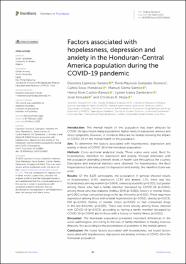| dc.contributor.author | Espinoza-Turcios, Eleonora | |
| dc.contributor.author | Gonzales-Romero, René Mauricio | |
| dc.contributor.author | Sosa-Mendoza, Carlos | |
| dc.contributor.author | Sierra-Santos, Manuel | |
| dc.contributor.author | Castro-Ramos, Henry Noel | |
| dc.contributor.author | Ivania Zambrano, Lysien | |
| dc.contributor.author | Armada, José | |
| dc.contributor.author | Mejía, Christian R | |
| dc.date.accessioned | 2023-05-29T20:14:49Z | |
| dc.date.available | 2023-05-29T20:14:49Z | |
| dc.date.issued | 2023-03-01 | |
| dc.identifier.uri | https://hdl.handle.net/20.500.13053/8637 | |
| dc.description.abstract | “Introduction: The mental health of the population has been affected by
COVID-19, reporting in many populations higher levels of depressive, anxious and
stress symptoms, however, in Honduras there are no studies showing the impact
of COVID-19 on the mental health of the population.
Aim: To determine the factors associated with hopelessness, depression and
anxiety in times of COVID-19 in the Honduran population.
Methods: Cross-sectional analytical study. Three scales were used, Beck for
hopelessness, Hamilton for depression and anxiety, through interviews with
the population attending different levels of health care throughout the country.
Descriptive and analytical statistics were obtained. For hopelessness, the Beck
Hopelessness Scale was used; for depression and anxiety, the Hamilton Scale was
used.
Results: Of the 8,125 participants, the population in general showed results
of hopelessness 14.9%, depression 12.9% and anxiety 1.2%, there was less
hopelessness among women (p = 0.004), university students (p < 0.001), but greater
among those who had a family member deceased by COVID-19 (p < 0.001),
among those who had diabetes mellitus (DM) (p < 0.001), history of mental illness
(p < 0.001) or had consumed drugs in the last 6 months (p < 0.001). There was more
depression among those with arterial hypertension (p = 0.002), obesity (p = 0.019),
DM (p = 0.004), history of mental illness (p < 0.001) or had consumed drugs
in the last 6 months (p < 0.001). There was more anxiety among those infected
with COVID-19 (p = 0.023), according to having a family member deceased by
COVID-19 (p = 0.045) and in those with a history of mental illness (p < 0.001).
Discussion: The Honduran population presented important differences in the
socio-pathological, according to the loss of family members or having previous
illnesses, this according to the presentation of problems in the mental sphere.
Conclusion: We found factors associated with hopelessness, we found factors
associated with hopelessness, depression and anxiety in times of COVID-19 in the
Honduran population“ | es_PE |
| dc.format | application/pdf | es_PE |
| dc.language.iso | eng | es_PE |
| dc.publisher | Frontiers Media S.A. | es_PE |
| dc.rights | info:eu-repo/semantics/openAccess | es_PE |
| dc.rights.uri | https://creativecommons.org/licenses/by/4.0/ | es_PE |
| dc.subject | anxiety, depression, hopelessness, Honduras, mental health, Central America | es_PE |
| dc.title | Factors associated with hopelessness, depression and anxiety in the Honduran-Central America population during the COVID-19 pandemic | es_PE |
| dc.type | info:eu-repo/semantics/article | es_PE |
| dc.identifier.doi | https://doi.org/10.3389/fpsyt.2023.1116881 | |
| dc.type.version | info:eu-repo/semantics/publishedVersion | es_PE |
| dc.publisher.country | CH | es_PE |
| dc.subject.ocde | 3.00.00 -- Ciencias médicas, Ciencias de la salud | es_PE |


